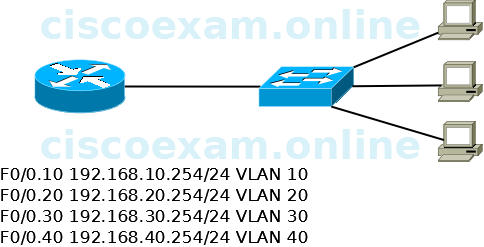You are connecting a new computer to Switch55. The new computer should be placed in the Accounting VLAN. You execute the show vlan command and get the following output:
Switch55#show vlan
VLAN Name Status Ports
---- -------------------------------- --------- -------------------------------
1 default active Fa0/1, Fa0/2, Fa0/3, Fa0/7,
Fa0/8, Fa0/9, Fa0/14, Fa0/16,
Fa0/19,Fa0/20, Fa0/23
10 sales active Fa0/10, Fa0/22
20 accounting active Fa0/5, Fa0/6, Fa0/15
30 hr active Fa0/11, Fa0/12
40 it active Fa0/17
<Output omitted>
Examine the additional network diagram.

What action should you take to place the new computer in the Accounting VLAN and allow for inter-VLAN routing?
| A. |
Connect the new computer to Fa0/1 | |
| B. |
Connect the new computer to Fa0/14 | |
| C. |
Connect the new computer to Fa0/5 | |
| D. |
Configure a dynamic routing protocol on the router interface |
Switchport Fa0/5 can be used to place the computer in the Accounting VLAN.
The diagram indicates that a router has been configured as a "router-on-a-stick" to perform inter-VLAN routing between VLANs 10, 20, 30 and 40.
The show vlan output indicates that interfaces Fa0/5, Fa0/15, and Fa0/6 have been assigned to VLAN 20, the Accounting VLAN:
20 accounting active Fa0/5, Fa0/6, Fa0/15
Switchports Fa0/1 and Fa0/14 are both in the default VLAN, as indicated by the portion of the output describing the switch ports that are unassigned and therefore still residing in the default VLAN:
1 default active Fa0/1, Fa0/2, Fa0/3, Fa0/7,
Fa0/8, Fa0/9, Fa0/14, Fa0/16,
Fa0/19,Fa0/20, Fa0/23
It is not necessary to configure a dynamic routing protocol on the router. Since the router is directly connected to all four subinterfaces and their associated networks, the networks will automatically be in the router's routing table, making inter-VLAN routing possible.